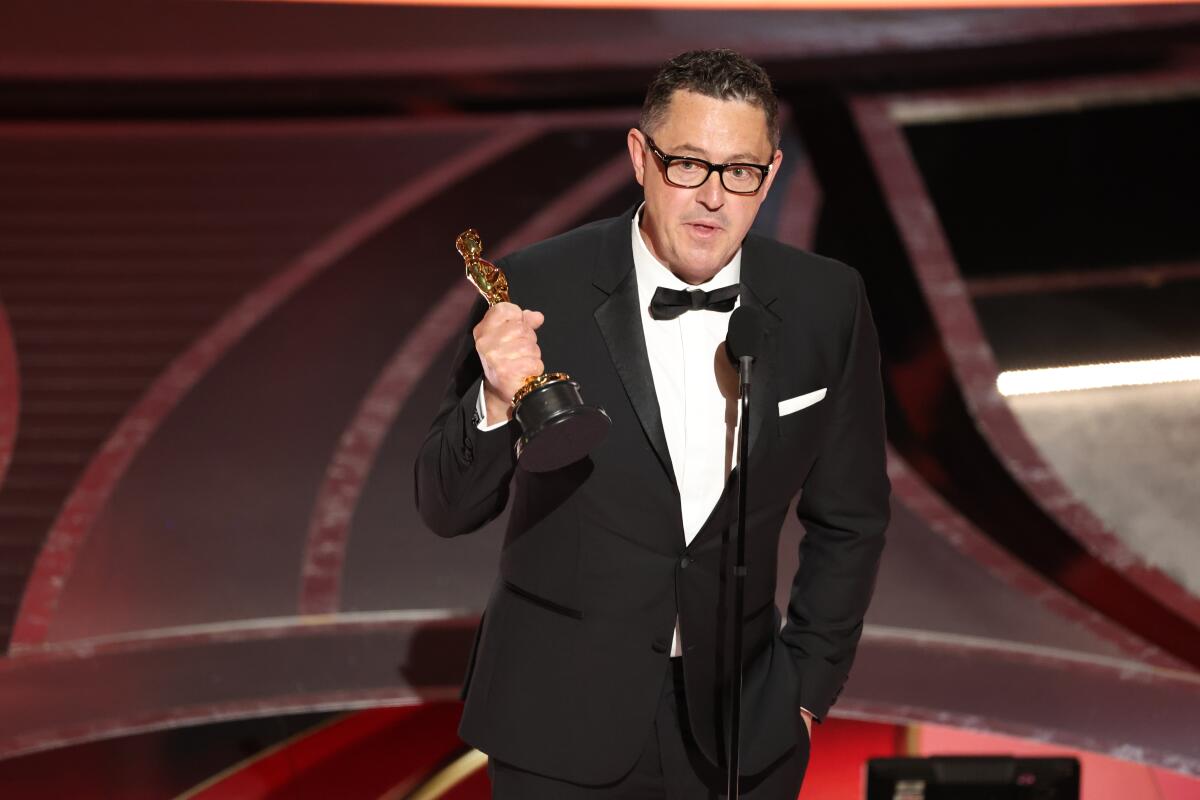‘Dune’ cinematographer offers the loudest call to bring back the old Oscars format

When hosts Jason Momoa and Josh Brolin took the stage for the Oscars pre-show early Sunday evening, Momoa got right to the point: “It’s a different year,” he said. “We want to address the elephant in the room.”
The punchline was that the actors were not going to do the usual Academy Awards hosting routine. But many of this year’s Oscar nominees were not laughing because there really was an elephant in the room: For the first time in Academy Awards history, eight awards categories were shunted from the telecast and presented in the hour before, while stars were still walking the red carpet outside Hollywood’s Dolby Theatre.
Although the film academy later incorporated winners and their speeches into the telecast, the question remained: Would winners in these categories — film editing, makeup and hairstyling, production design, original score, sound and the three short-film contests — speak out about feeling disrespected by their own industry?
Beyond indirect comments made by Linda Dowds, one of the makeup and hairstyling artists from “The Eyes of Tammy Faye,” winners avoided amplifying the controversy in acceptance speeches. The first person to address the telecast change head-on was “Dune” cinematographer Greig Fraser when speaking to reporters in the Oscars press room.
After being asked to comment on the change, Fraser got laughs in the press room with his answer: “How long do you have?”
“Seriously, because I could probably talk to you about [it] for about 35 minutes ... 30 hours, actually.”
Fraser, whose category was kept in the main telecast as in years past, went on to characterize the pre-show as “fun.”
“You know why it was fun? Because it was a bit more informal — that was why it was fun. But it’s tricky, you know. I know we balance economics with the awards shows, but films are made by the sound recorders, by the visual effects supervisors, by the editors, by the production designers. That’s how films are made, and it seems odd to have some random relegation.
“Everybody in this crowd realizes and understands why this happens. Like, we’re not silly, and we understand the economics. But at the same time, it’s up to us, I think, to change the economics. To change the fact that ... we want to encourage kids who are watching these awards to go, ‘You know what? I’m not an actor, I’m not a director, I’m not a producer, but I want to be a makeup artist.’”
Costume designer Jenny Beavan, a winner for “Cruella,” said the splicing of taped pre-show winners into the live telecast was “much better than I’d feared.” But she added that she “didn’t feel it was right and felt it was very disrespectful. I think they’ve really got to think about it for next year.”
In the weeks leading up to Sunday’s awards, prominent nominees including Steven Spielberg, Jane Campion, Denis Villeneuve and Guillermo del Toro had denounced the change in format, which some believed made craft categories look like second- or third-tier races.
Before the show, in the pre-telecast ceremony, much of Hollywood clearly made an effort to show up early and support their below-the-line colleagues. Spielberg entered the room early; “Licorice Pizza” writer-director Paul Thomas Anderson and Maya Rudolph hustled to their seats as the Dolby bar shut down and event organizers worked hard to get the crowd in place for the presentation of the first award.
But as lights flashed for the audience to get seated and the hosts read out the names of the first winners, major stars such as Javier Bardem, Jake Gyllenhaal, Tyler Perry and Bill Murray were just arriving on the red carpet.
Fraser reiterated that he understood the reasons the film academy made the change, but he called it “shortsighted.”
“I just want my particular collaborators, particularly production design, editing, makeup and hair, to be equally rewarded for the job they do.”
Careers in the entertainment industry can be mysterious for those just starting out, and even for those working in the business. The Los Angeles Times brings you explainers and advice for starting and building your career in Hollywood.
More to Read
The biggest entertainment stories
Get our big stories about Hollywood, film, television, music, arts, culture and more right in your inbox as soon as they publish.
You may occasionally receive promotional content from the Los Angeles Times.














